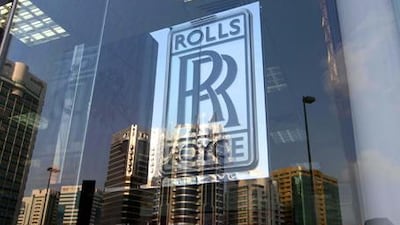DUBAI // There is somewhat less of the Spirit of Ecstasy emanating from Abu Dhabi's Rolls-Royce dealership these days, thanks to the global financial crisis. The world's most prolific seller of the luxury car with its renowned bonnet ornament has been tipped from its fine leather throne to a spot further down the list of the top retailers worldwide.
The capital had to settle for the ignominy of selling only the fourth-highest number of "Rollers", while its more brash cousin to the north held on to second place. "Our customer base is not immune against the effects of the economic climate and that of the credit crunch," said Frank Tiemann, the communications manager for Rolls-Royce Europe and the Middle East. "Having said that, even in Dubai there are still many wealthy people that are not affected."
But while the quantity sold has suffered slightly, the special quality of cars demanded by Abu Dhabi buyers is as lofty as it has ever been. Abu Dhabi last year sold the most customised Rolls-Royce's globally, with clients insisting on changes to suit their exclusive styles in a process that can easily double the base price of US$400,000 (Dh1.46 million) for each vehicle. The Dubai dealership sold the second-largest number of bespoke cars.
"They are spending the most on each and every car," Mr Tiemann said. "The UAE in general is very important in our business, especially because of the market's focus on individualisation and exclusivity." Laurent-Patrick Gally, a retail analyst at Shuaa Capital, said he was surprised that Rolls-Royce's Dubai dealership outsold the one in the capital, as retail sales and consumer sentiment had been higher in Abu Dhabi last year.
"Given the current environment, you would expect some sort of growth in Abu Dhabi," Mr Gally said. But he said that in the absence of specific figures it was difficult to draw a conclusion. One fleet purchase at a Dubai hotel, of four or five cars, could tip the balance. Mr Tiemann said vehicle sales between the two markets historically had been quite stable and similar. In 2007, Dubai was home to the top-selling market and Abu Dhabi ranked second.
"Sometimes Dubai sells more, sometimes Abu Dhabi does," he said. "They are not too far away from each other. We are talking in general about small figures. Even two cars make a big difference." Mr Tiemann said Rolls-Royce sales across the UAE were "slightly down" last year, but would not give specific figures. The dealerships in Doha and Jeddah, however, saw sales rise last year. Across the Middle East, sales were down about 10 per cent. This is compared with 48 per cent sales growth in 2008, up from 40 per cent in 2007. Of the 1,002 Rolls-Royce cars sold across the globe, 20 per cent were sold in the Middle East, Mr Tiemann said.
The UAE was Rolls-Royce's third-biggest market, behind the US and the UK, and ahead of China and Saudi Arabia. Car sales suffered in the country last year after banks tightened lending criteria and the once free-flowing credit for vehicle purchases dried up. The UK research firm Business Monitor International estimated the UAE market shrank by 8.5 per cent last year. It estimated that 324,900 vehicles were sold, some destined for re-export.
Mercedes-Benz sales fell by 19 per cent to about 15,200 cars, while sales at Al Futtaim, which sells Lexus and Toyota brands in the UAE, fell to between an estimated 55,000 and 66,000 cars across the country, compared with sales of 98,000 the year before. @Email:aligaya@thenational.ae

